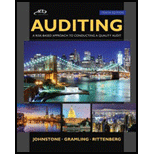
Concept introduction: An audit is an independent examination conducted to ensure that the financial statements are true and fair. Auditing standards are certain defined rules and regulation that provide guidance to the auditors for conducting the audit efficiently and effectively. The auditing standards are followed to fulfill the objective of audit.
Sarbanes-Oxley Act or SOX was introduced in 2002 by the U.S. government after several accounting scams. The Act defines the responsibilities of the board of director of a public company and adds criminal liabilities for wrongful acts of the management and board of directors.
To indicate: Independence as the cornerstone of the auditing profession and its relation with the Sarbanes-Oxley Act.
Want to see the full answer?
Check out a sample textbook solution
Chapter 1 Solutions
Auditing: A Risk Based-Approach to Conducting a Quality Audit
- Please explain the solution to this general accounting problem with accurate principles.arrow_forwardI need the correct answer to this general accounting problem using the standard accounting approach.arrow_forwardI am searching for the correct answer to this Financial accounting problem with proper accounting rules.arrow_forward
- Can you explain the process for solving this General accounting question accurately?arrow_forwardI need help with this general accounting question using standard accounting techniques.arrow_forwardPlease explain the solution to this general accounting problem with accurate explanations.arrow_forward
- I am looking for the most effective method for solving this financial accounting problem.arrow_forwardI am looking for the correct answer to this general accounting question with appropriate explanations.arrow_forwardCan you help me solve this general accounting question using valid accounting techniques?arrow_forward
 Auditing: A Risk Based-Approach to Conducting a Q...AccountingISBN:9781305080577Author:Karla M Johnstone, Audrey A. Gramling, Larry E. RittenbergPublisher:South-Western College Pub
Auditing: A Risk Based-Approach to Conducting a Q...AccountingISBN:9781305080577Author:Karla M Johnstone, Audrey A. Gramling, Larry E. RittenbergPublisher:South-Western College Pub Auditing: A Risk Based-Approach (MindTap Course L...AccountingISBN:9781337619455Author:Karla M Johnstone, Audrey A. Gramling, Larry E. RittenbergPublisher:Cengage LearningBusiness/Professional Ethics Directors/Executives...AccountingISBN:9781337485913Author:BROOKSPublisher:Cengage
Auditing: A Risk Based-Approach (MindTap Course L...AccountingISBN:9781337619455Author:Karla M Johnstone, Audrey A. Gramling, Larry E. RittenbergPublisher:Cengage LearningBusiness/Professional Ethics Directors/Executives...AccountingISBN:9781337485913Author:BROOKSPublisher:Cengage Intermediate Accounting: Reporting And AnalysisAccountingISBN:9781337788281Author:James M. Wahlen, Jefferson P. Jones, Donald PagachPublisher:Cengage Learning
Intermediate Accounting: Reporting And AnalysisAccountingISBN:9781337788281Author:James M. Wahlen, Jefferson P. Jones, Donald PagachPublisher:Cengage Learning




